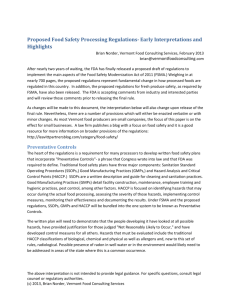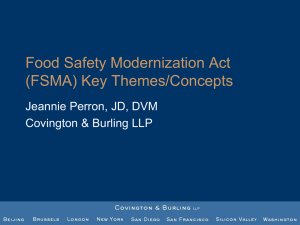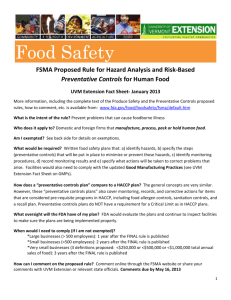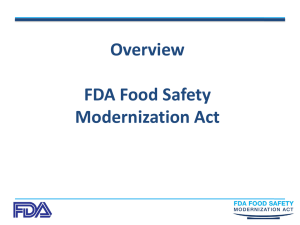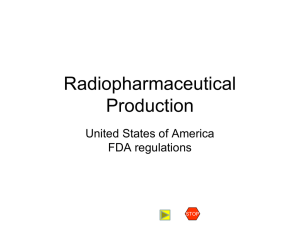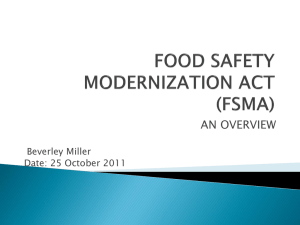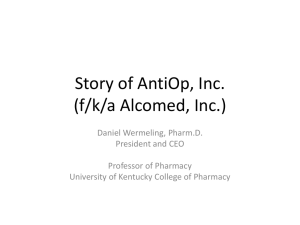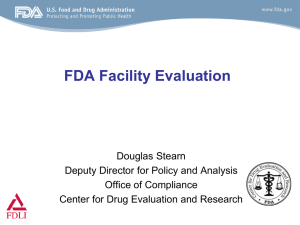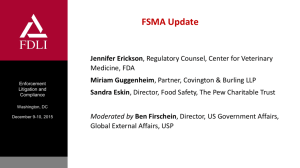Power point - Michigan Potato Industry Commission
advertisement
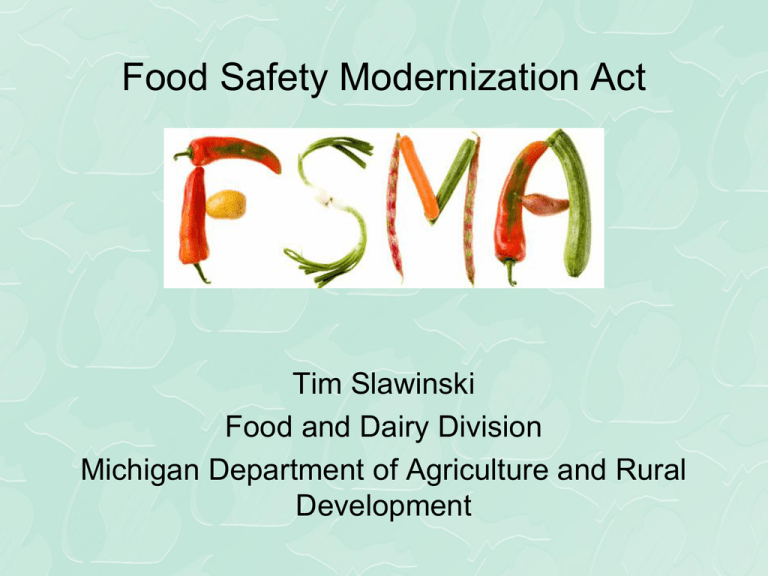
Food Safety Modernization Act Proposed Rules Tim Slawinski Food and Dairy Division Michigan Department of Agriculture and Rural Development Agenda • • • • • Overview of the Process Content of proposed rules Updates on feedback Potential Concerns To-Do List February 2013 Food Safety Modernization Act (FSMA) • Signed into Law January 4, 2011 • Proposed rules published January 16, 2013 – Standards for Produce Safety – Preventive Controls for Human Food • Animal feed rules yet to be released • 120 day public comment period (ends 5/16/13) • FDA review of comments • Final rules published February 2013 Compliance Dates • Preventive Controls: – 1 Year – Large Businesses >500 Employees – 2 Years – Small Businesses <500 employees – 3 Years – Very Small Businesses 3 options being considered <$1M, <$500K, <250K February 2013 Who’s in and Who’s out • FDA Registration for Bioterrorism Act – Facilities Required to Register are in – 2 Levels of Exemptions: • Not Required to Register – Full Exemption • Required to Register, but Exemption in Rule – Partial Exemption January 2013 Registration Required • Firms that Manufacture, Process, Pack or Hold Human Food. – Confusion over who must register • Farm Activity vs. Manufacturing • Mixed-Type Facilities (Farm and Manufacturing) – Guidance documents now available February 2013 Exempt from Registration • • • • • • • Farms Restaurants Retail Food Establishments Non-Profit Food Facilities USDA Facilities Transport Vehicles Private Residence (Cottage Foods) January 2013 Partial Exemptions in the Rule • • • • • • • Juice, Seafood & Low Acid Canned Food Certain types of storage facilities Alcoholic Beverages Dietary Supplements Low-Risk On-Farm Processing Very Small Businesses Tester Amendment February 2013 Modified Requirements • Qualified Facilities: – Very Small Businesses – Tester Amendment • <$500K annual sales and • 50% of sales local (in-state or within 275 mi.) • Submit Documentation to confirm: – Firm meets “Qualified Facility” requirements – Compliance with State Law – Label Requirement February 2013 Content of Preventive Controls • Changes to 21 CFR 110 (CGMPs) – Applies to most partially exempt facilities • Food Safety Plan Required – Similar to HACCP + Pre-req. programs • Hazard analysis, preventive controls, monitoring, corrective action, verification, validation February 2013 Warehouse • Packaged Food: – CGMPs apply – Exempt from Food Safety Plan • Modified Requirements for Refrigerated • Raw Agricultural Commodities – Exempt from CGMPs – Exempt from Food Safety Plan • Except for fruits and vegetables February 2013 Warehouse • RAC Fruits and Vegetables – Exempt from CGMPs – Food Safety Plan Applies • Boxed Fruit in a CGMP Warehouse? – Is a Banana Box considered “Packaged”? • WIP or Bulk Ingredient Storage? January 2013 Mixed-Type Facilities • • • • On-Farm Manufacturing Both Rules Apply “Own RACs” vs. “Others RACs” Change to “RAC Exemption” – CGMPs apply to mixed-type facilities February 2013 CGMP Changes • Change from 110 to 117 • Editorial Changes • Remove Recommendations – Some changed to requirements • Add “Cross Contact” • Change to “RAC Exemption” February 2013 Cross Contact • Wearing outer garments suitable to the operation in a manner that protects against the contamination of food, foodcontact surfaces, or food-packaging materials, and to protect against the cross-contact of food February 2013 Training • Personnel responsible for identifying sanitation failures or food contamination – Education and/or experience requirement • Food handlers and supervisors – “Appropriate” Training February 2013 Food Safety Plan • Hazard Analysis • Preventive Controls – Hazards Reasonably Likely to Occur • • • • Monitoring Corrective Action Verification (includes Validation) Recall Plan January 2013 Hazard Analysis • Biological, Chemical, Physical Radiological • Must include Environmental Pathogens in exposed RTE areas • Identify Hazards Reasonably Likely to Occur (not just CCPs). January 2013 Preventive Controls • Hazard Reasonably Likely to Occur • Must Significantly Minimize or Prevent • Must Include “as appropriate”: – Process controls – Food Allergen Controls – Sanitation Controls (Food Contact) – Recall Plan – Others January 2013 Food Safety Plan Cont. • Monitoring • Corrective Action • Verification – Validation required except for Allergen, Sanitation and Recall Plan – Direct Observation Required – Reanalysis every 3 years January 2013 Qualified Individual • • • • • • Trained in Risk-Based Preventive Controls Prepare the food safety plan Validate Preventive Controls Review records effectiveness Review corrective actions Perform the reanalysis of the Food Safety Plan February 2013 Recall Plan • Recall Plan Required – Notifications, Responsibilities, Effectiveness, Disposition – Request for comment on Mock Recalls • Traceability? – Mock Recall vs. Traceability Exercise February 2013 Not “Required” FDA has requested comment on: • Product Testing • Environmental Monitoring • Supplier Verification February 2013 Industry Coordination • FDA Listening Session – April 24, 2013. – MDARD to host 1 of 5 in the nation. – Direct contact with FDA decision makers. – Limited on-site space available. – Webinar format for those off-site. • Food Processors Working Group – April 10, 2013 February 2013 • • • • Review the Proposed Rules Determine the impact Submit Comments to FDA by 5/16/13. Start preparing for change February 2013 Value of Feedback • Why submit comment to the FDA? – Help to shape the final rules – Guidance Documents • Why inform MDARD? – Connected to other state agencies February2013 Resources • FDA FSMA Proposed Rules page – http://www.fda.gov/Food/FoodSafety/FSMA/ucm3 34120.htm?source=govdelivery • Page Contents: – Fact Sheets on proposed rules – Full text of proposed rules – Links to submit comment to Federal Register February 2013 Questions? Byron Beerbower Tim Slawinski MDARD (517) 241-0934 beerbowerb@michigan.gov MDARD (517) 335-3830 slawinskit@michigan.gov

